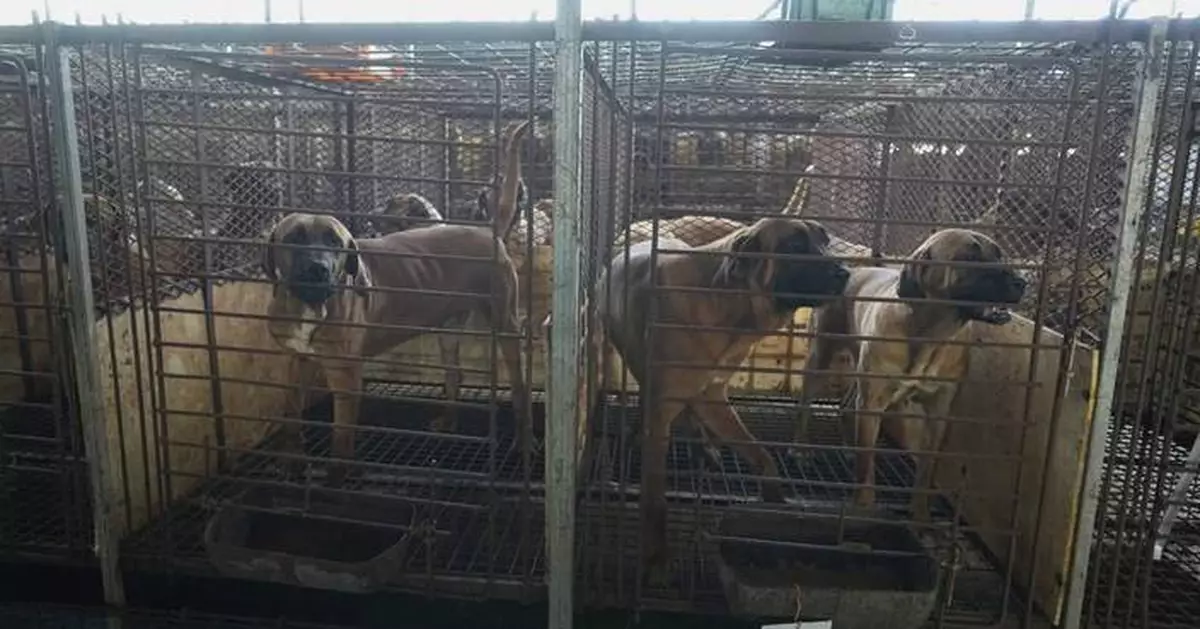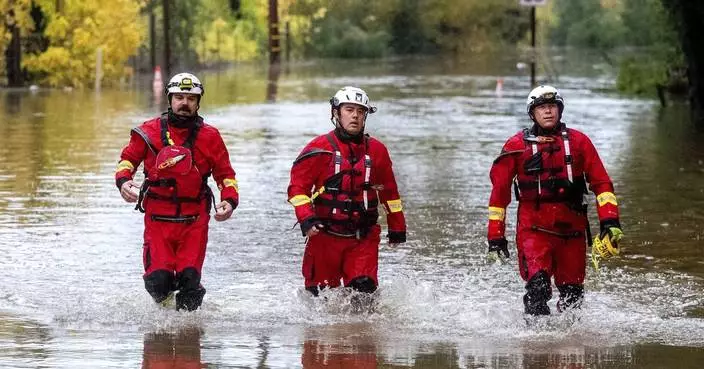SEOUL, South Korea (AP) — South Korea announced plans Thursday to compensate farmers and others in the country's dwindling dog meat industry before a formal ban goes into effect in 2027, a move that is drawing opposition from both farmers and some animal rights activists.
South Korea’s parliament passed a landmark bill in January that will ban slaughtering, breeding or selling dog meat for human consumption after a three-year grace period. It will be punishable by 2-3 years in prison.
The Agriculture Ministry said that farmers would receive compensation starting from 225,000 won ($170), and rising up to 600,000 won ($450) per dog if they agree to shut down their businesses early.
An association of farmers rejected the offer, saying in a statement that they cannot relinquish their dogs for such low prices. Farmers earlier called for 2 million won ($1,505) per dog. They’ve said the ban infringes on their right to choose their own jobs and will aggravate their economic difficulties.
The association said that farmers will keep fighting even if they end up being jailed. Earlier in the week, they called for the law to be amended to extend the grace period and add appropriate compensation plans.
Sangkyung Lee, a campaign manager at the Korean office of the anti-animal cruelty group Humane Society International, called the South Korean announcement “an important milestone in this historic ban that will see the ban through to completion and end our country’s dog meat era for good.”
But Lee said his office is disappointed at the South Korean plan because it would pay farmers based on the number of dogs they have, “potentially increasing dog breeding to get more money from the scheme and more puppies being born into suffering.”
The Korean Animal Welfare Association, a Seoul-based animal rights group, said that local governments must strictly monitor farms to prevent them from increasing their number of dogs through breeding. It praised the government for trying to take reasonable steps to phase out the industry but criticized farmers for seeking excessive compensation.
Dog meat consumption is a centuries-old practice on the Korean Peninsula. It's also eaten in China, Vietnam, Indonesia and some African countries. But South Korea’s dog meat industry has drawn more attention because of the country’s reputation as a cultural and economic powerhouse. It’s also the only nation with industrial-scale dog farms.
South Korea’s anti-dog meat campaign received a big boost from the country’s first lady, Kim Keon Hee, who repeatedly expressed her support for a prohibition. She was subjected to withering criticism and crude insults during demonstrations by farmers.
Surveys have found that around one in three South Koreans opposes the ban, though most people now don’t eat dog meat.
Vice Agriculture Minister Park Beomsu told reporters that government studies found that about 466,000 dogs are currently being raised for food across South Korea. He said officials will try to convince farmers to voluntarily phase out dog breeding ahead of the ban.
After the ban comes into force, Park said, the government plans to facilitate adoptions for the remaining dogs or move them to care facilities rather than euthanize them.
The agriculture ministry said butchers will also be compensated, while local authorities will be responsible for dismantling dog farms and slaughterhouses. Former farmers and butchers will also get low-interests loans if they pivot to other agricultural businesses.
The ministry said authorities will also offer financial assistance to traders and restaurant owners to shut down their businesses and find new jobs.
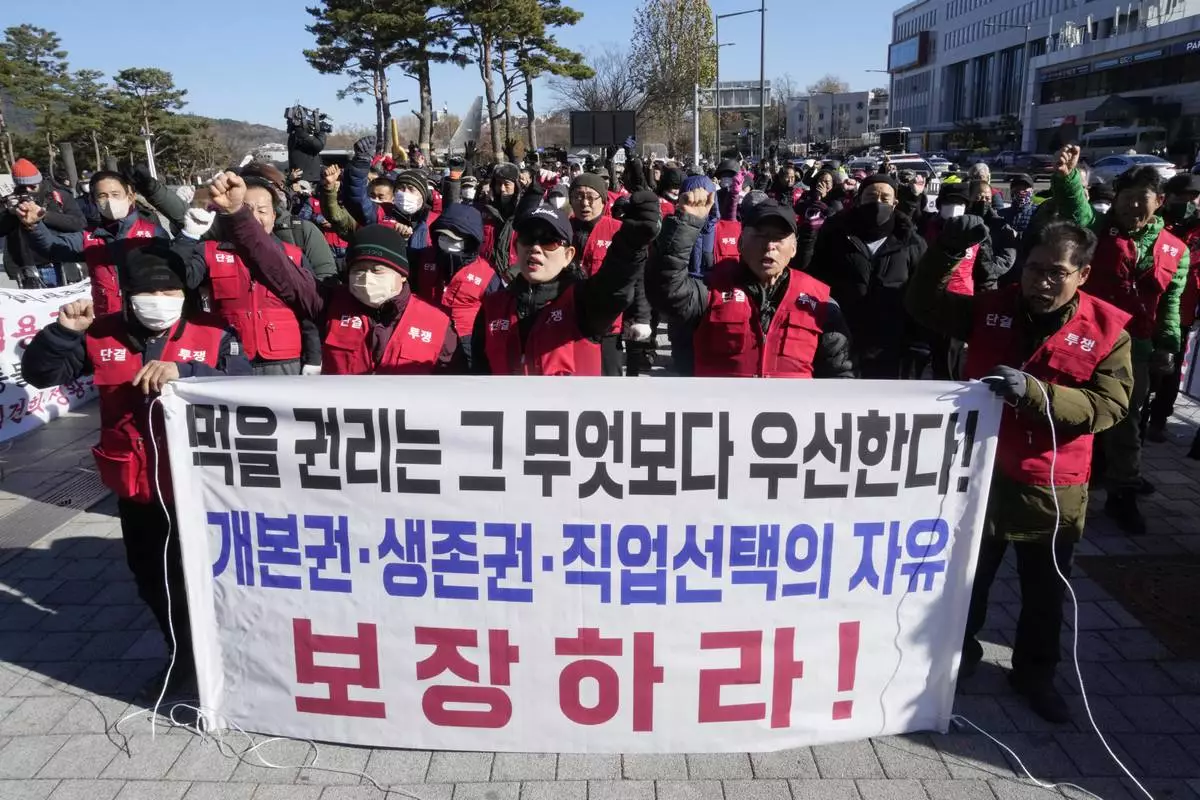
FILE - Dog farmers shout slogans during a rally against the government-led dog meat banning bill in front of the presidential office in Seoul, South Korea on Nov. 30, 2023. The letters read "Guarantee the right to life and freedom of choice of occupation." (AP Photo/Ahn Young-joon, File)
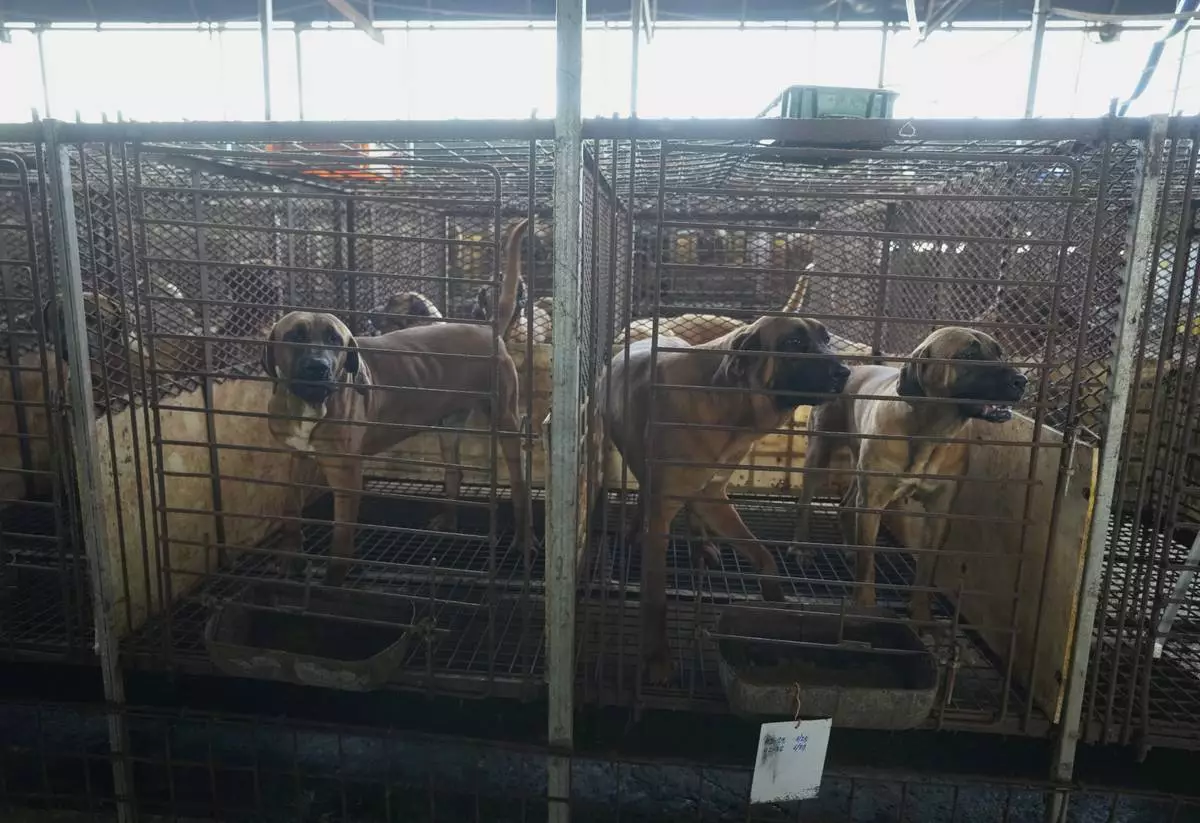
FILE - Dogs are seen in cages at a dog farm in Pyeongtaek, South Korea on June 27, 2023. (AP Photo/Ahn Young-joon, File)
BAKU, Azerbaijan (AP) — The United Nations' annual climate talks pushed into overtime Saturday under a cloud of anger and disappointment as negotiators were well short of a deal on money for developing nations to curb and adapt to climate change.
A draft of the final agreement Friday pledged $250 billion annually by 2035, more than double the previous goal of $100 billion set 15 years ago but far short of the annual $1 trillion-plus that experts say is needed. Through the early hours of Saturday morning, The Associated Press saw lead negotiators from the European Union, the United States and other nations going through the empty halls from meeting to meeting as delegates tried to hash out a new version of the deal.
“We're still working hard,” U.S. climate envoy John Podesta told the AP past 4 a.m. local time.
The climate talks, called COP29, in Baku, Azerbaijan, were scheduled to end Friday. Workers have already begun dismantling the venue for the talks.
Wealthy nations are obligated to help vulnerable countries under an agreement reached at these talks in Paris in 2015. Developing nations are seeking $1.3 trillion to help adapt to droughts, floods, rising seas and extreme heat, pay for losses and damages caused by extreme weather, and transition their energy systems away from planet-warming fossil fuels and toward clean energy.
Representatives of some of the nations that are obliged to contribute the cash said the $250 billion climate finance figure is realistic and reflects their limits at a time when their own economies are stretched.
The amount in any deal reached at COP negotiations — often considered a “core” — will then be mobilized or leveraged for greater climate spending. But much of that means loans for countries drowning in debt.
But that meant little to vulnerable nations, many already battered by extreme weather made worse largely by emissions from the burning of fossil fuels they've had little to do with. Most of those emissions have come from the developed world since the Industrial Revolution.
“Developed countries must commit trillions, not empty promises," said Harjeet Singh, Director for the Fossil Fuel Non-Proliferation Treaty Initiative. "Anything less makes them squarely responsible for the failure of these talks and the betrayal of billions across the globe.”
Nikki Reisch, director of the climate and energy program at the Center for International Environmental Law, said the offering was unacceptable not just because the money is low, but because “it’s really designed to escape and evade the legal obligation that developed countries have” to pay for the climate change they have largely caused.
Several dozen activists marched in silence outside the halls where delegates meet late Friday, raising and crossing their arms in front of themselves to indicate rejection of the draft text.
With bleary eyes, seated around cold pizza, a group of youth activists chatted to keep each other awake in one of the main halls of the venue.
“All of us are kind of in mourning in a way,” said Jessica Dunne, with the Alliance of Non-Governmental Radical Youth. This is her fourth COP, and along with the other activists present, she’s disappointed and deeply worried about the current deal on offer. But the group said being in community eases the painful emotions that come with a process Dunne called an “abject failure.”
“In these halls tonight, as we’re sitting here and we’re talking and we’re dancing and crying and laughing, it kind of gives you hope that there will be another day that we’re going to fight for,” she said.
“I’m really tired,” said Erica Njuguna, a climate activist from Kenya. “But we are holding the line, making sure that COP delivers for people on the front lines of the climate crisis. So far it hasn’t.”
Associated Press journalist Joshua A. Bickel contributed to this report.
The Associated Press’ climate and environmental coverage receives financial support from multiple private foundations. AP is solely responsible for all content. Find AP’s standards for working with philanthropies, a list of supporters and funded coverage areas at AP.org.
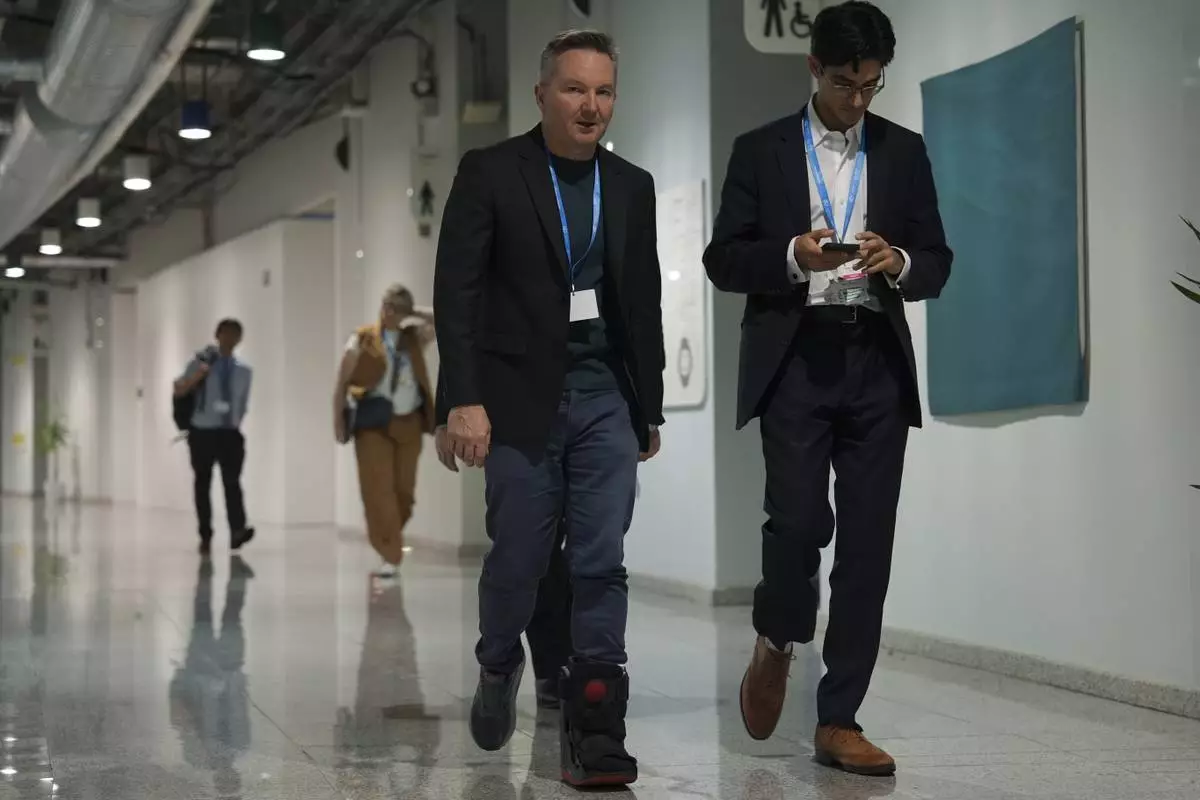
Australia Climate Minister Chris Bowen, center, walks through a hallway at the COP29 U.N. Climate Summit in the early hours of Saturday, Nov. 23, 2024, in Baku, Azerbaijan. (AP Photo/Joshua A. Bickel)
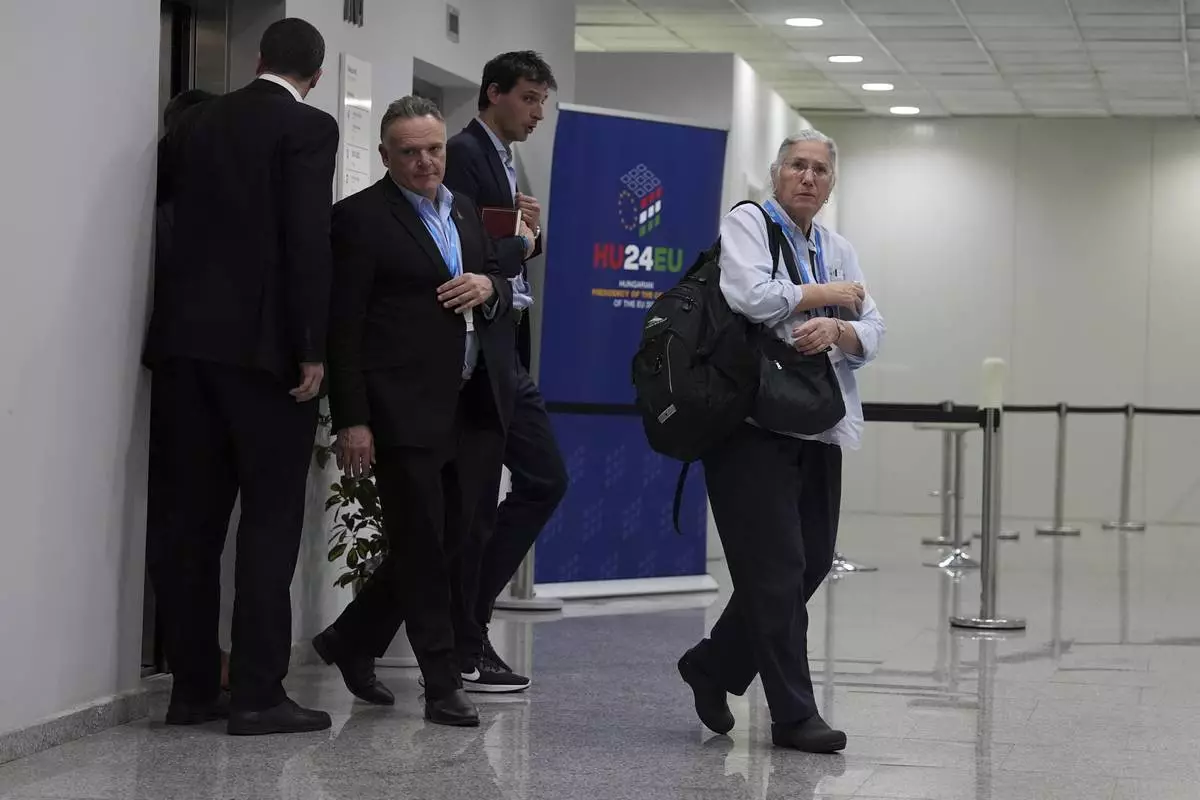
U.S. Deputy Climate Envoy Sue Biniaz, right, and Wopke Hoekstra, EU climate commissioner, second from right, walk out of an elevator during the COP29 U.N. Climate Summit in the early hours of Saturday, Nov. 23, 2024, in Baku, Azerbaijan. (AP Photo/Joshua A. Bickel)

John Podesta, U.S. climate envoy, right, walks through the hallways of the COP29 U.N. Climate Summit in the early hours of Saturday, Nov. 23, 2024, in Baku, Azerbaijan. (AP Photo/Joshua A. Bickel)

People sleep in the Chinese delegation offices at the COP29 U.N. Climate Summit in the early hours of Saturday, Nov. 23, 2024, in Baku, Azerbaijan. (AP Photo/Joshua A. Bickel)

Activists demonstrate in silence protesting a draft of a proposed deal for curbing climate change at the COP29 U.N. Climate Summit, Friday, Nov. 22, 2024, in Baku, Azerbaijan. (AP Photo/Rafiq Maqbool)




